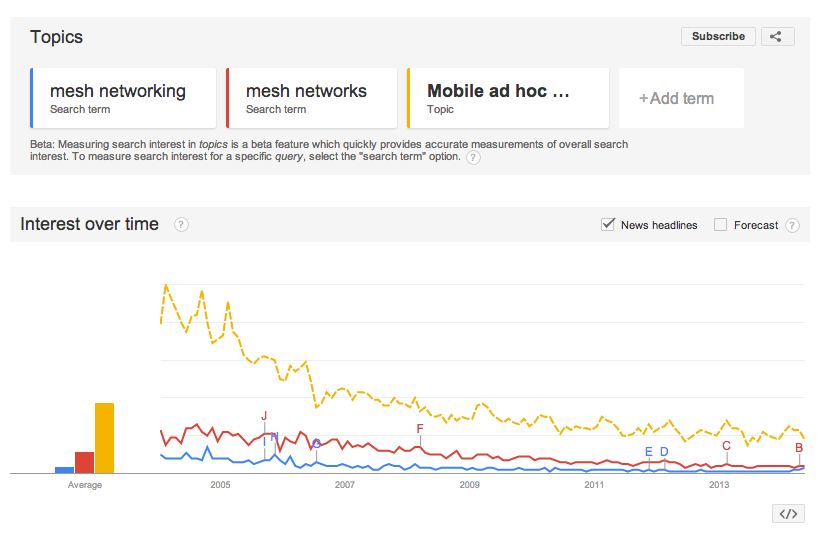Why isn't mesh networking more popular?
May 11, 2014
Mesh networking is an exciting idea (quick explainer below if you’ve never heard of it), the technology (largely) exists to do it, and there are some pretty clear use cases related to routing around entrenched internet gatekeepers (whether they are governmental or private).
Perhaps most importantly, the idea of mesh networking seems to be a fit with our current trend toward decentralization, where there’s money to be made in providing infrastructure for peer-to-peer networks, rather than for providing services directly. Think of Uber, Airbnb, or Bitcoin.
And yet this Google Trends graph shows declining interest in mesh networking. Why?

As a quick recap, connectivity over a mesh network is like a grid of streets as opposed to a single interstate highway.
If you’re on a mesh network, a request from your phone can go to a cellular tower as it normally would. Or, the request goes to someone else’s phone nearby, and that person’s phone then gets the data from a cellular tower. Or, through some other device or chain of devices. Advantages include:
Vastly increased reliability, and potentially performance, of the network by providing many alternative paths for data
Resistance to network shutdown or damage (by governments or others) for the same reasons
Increased coverage, since areas at the edge of a cellular tower’s range (for example) can be connected with nearby devices as intermediaries
Of course, the technical problems of building a network that can heal, adjust and optimize itself in real-time are enormous, though many of these challenges are already being addressed.
There are a couple of recent-ish developments, too. Apple released the Multipeer Connectivity Framework in iOS 7. Though limited in its application so far, it essentially allows iDevices to create their own mesh networks. (Android doesn’t appear to have an equivalent, though I’m not sure).
The most popular application using that capability right now is FireChat. The company that makes FireChat has also released Open Garden, which is a mesh networking tool for desktop devices. Fred Wilson loved it (in 2012).
And… that’s it?
It seems as if there a few ways that mesh networking could get popular:
Network congestion and failure could become such an issue that consumers are driven en masse to a different way of doing things. For example, cellphone networks become unusable or a giant ISP starts throttling traffic to non-preferred providers, and consumers get frustrated. Killing net neutrality rules seems like a good way to make this happen, but only if consumers are made aware of whose fault the delays actually are. In general, in my personal experience I’m seeing the opposite happen (the networks I use every day are getting more satisfactory, not less), but others have had other experiences.
Alternatively, ISPs could somehow become so desperate for better bandwidth utilization that they are willing to consider a technology that would eventually render them even more commoditized than they currently are.
Mesh networks are deployed in developing / authoritarian countries with significant impact. I don’t see people being aware enough of what’s going in the developing world to care about mesh networks that are successful there. But perhaps some kind of political change becomes possible because of the technology, and we hear about it.
I think the most likely way is that some “killer app” offers mesh networking as an option, taking advantage of its ability to (a) work where internet access may not be available, (b) transmit data faster than current methods of connection for sharing larger files such as video, and / or © preserve anonymity, since peer-to-peer traffic can’t be collected as easily by government or other agencies. It looks like this is what Open Garden is currently trying to do with Firechat.
I haven’t spent much time thinking about the problem, but I wonder what other applications would benefit from mesh networking’s advantages enough such that they can get it introduced to the public consciousness.
Thanks for reading! Join the discussion on Hacker News. You may also want to follow me on Twitter.